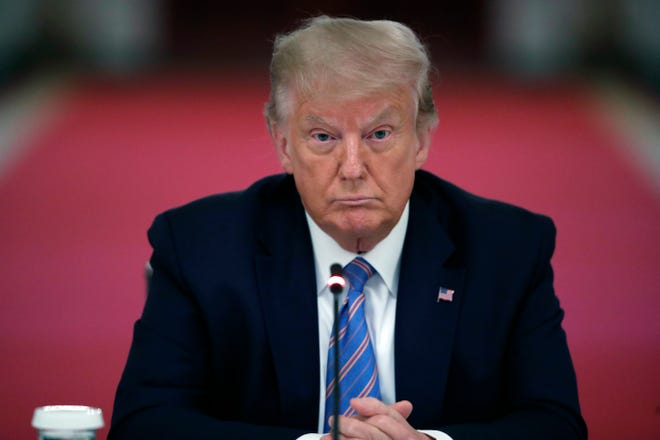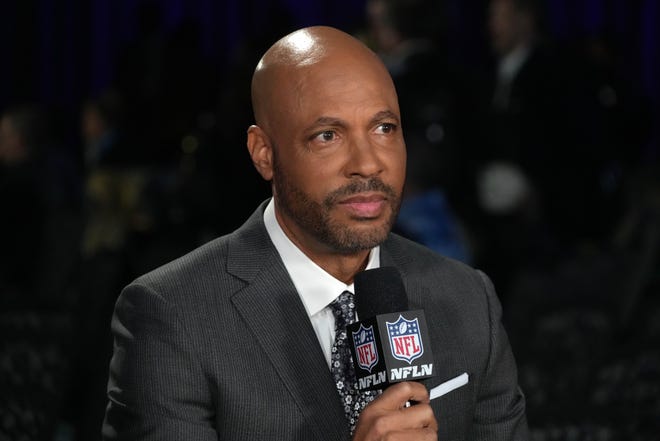
WASHINGTON – Former President Donald Trump asked the Supreme Court on Thursday to block the House committee investigating the Jan. 6 Capitol insurrection from getting documents from the National Archives and Records Administration.
Trump’s lawyers, Justin Clark and Jesse Binnall, argued that confidential deliberations are fundamental to the operation of government and Congress limited its ability to access presidential records. But the lawyers argued the investigating committee ignored the restrictions with its sweeping request for documents.
“The Constitution, this Court’s precedent, and federal statutes invalidate the expansive request at issue here,” the lawyers wrote in their 195-page submission to the nation's highest court. “Moreover, a former President has the right to assert executive privilege, even after his term of office.”
The lawyers also asked the court to continue blocking the release of documents while the case is pending before the high court. A U.S. district court ordered the release of documents, but the appeals court kept the records confidential until Thursday, to allow time for Trump to appeal to the Supreme Court.
The House committee investigating the Jan. 6 attack asked the high court Thursday to expedite consideration of Trump’s case, suggesting both sides could file briefs by Dec. 30 and the court could decide whether to hear the case Jan. 14. Lawmakers are seeking access to the documents urgently because they are trying to complete their investigation and pursue legislation for the 2022 election.
“Delay would inflict a serious injury on the Select Committee and the public by interfering with this mandate,” the committee said in an eight-page filing. “The Select Committee needs the requested documents now to help shape the direction of the investigation and allow the Select Committee to timely recommend remedial legislation.”
President Joe Biden waived executive privilege to allow the committee access to the documents, which courts have ruled outweighs Trump's claims. Michael Gwin, a White House spokesman, said executive privilege should not be used to shield information that reflects a clear effort to subvert the Constitution.
"Former President Trump abused the office of the presidency and attempted to subvert a peaceful transfer of power," Gwin said. "The former president's actions represented a unique – and existential – threat to our democracy that can't be swept under the rug."
Trump objected to the release of hundreds of pages of documents, arguing the records should remain confidential because of executive privilege. The contested documents include handwritten notes about what was happening that day and call logs for Trump and Vice President Mike Pence, whose life was threatened as he oversaw Electoral College vote counting in his capacity as Senate president.
But the district court and the U.S. Court of Appeals for the D.C. Circuit each ruled that Biden’s waiver of executive privilege for the Jan. 6 investigation outweighed Trump’s claim.
The case is significant not only for the documents at stake, but because several Trump aides and advisers have defied committee subpoenas by citing executive privilege. The high court’s decision could help define guidelines for congressional oversight and investigation of the executive branch.

Steve Bannon, a onetime Trump political strategist, faces trial on contempt charges July 18. The House cited former White House chief of staff Mark Meadows for contempt Dec. 14 and urged the Justice Department to charge him criminally. Former Justice Department official Jeffrey Clark has also refused to answer questions, but the House postponed voting on a contempt citation against him until after he meets with the committee again.
In the Trump case, the committee asked for written communications, calendar entries, videos, photographs or other media related to Jan. 6 and its aftermath, strategies on how to delay the Electoral College vote that day and the planning of the rally before the attack on the Capitol, among other requests.
Though the focus was on Jan. 6, it also spanned 2020 for Trump’s public remarks about the election and its validity, the transfer of power, potential changes of personnel in executive branch agencies and foreign influence in the election.
More:Who has been subpoenaed so far by the Jan. 6 committee?
Trump sued the National Archives in federal court Oct. 18 to block the release by arguing the documents should be kept confidential under executive privilege, to ensure that presidents receive candid advice from aides.
Biden waived executive privilege for Trump on Oct. 8. District Court Judge Tanya Chutkan refused to block the release.
Trump's lawyers repeated the same arguments that lost in the lower courts, saying presidential records are typically unavailable until 12 years after a term ends, that the committee’s request is too broad and that Congress has no legislative purpose for requesting them.
“This sweeping request alone demands access to any number of records to which Congress is not – in any way – entitled,” the lawyers wrote. “The congressional request is untethered from any valid legislative purpose and exceeds the authority of Congress under the Constitution and the Presidential Records Act.”
But members of the committee have argued they are contemplating legislation to prevent another attack on the Capitol or disruption to an election, such as the temporary halt of counting Electoral College votes.
“This committee is engaged in critical investigative and legislative activity for which there is no greater purpose in terms of Congress’ responsibility,” Rep. Liz Cheney of Wyoming, the top Republican on the committee, said Dec. 14 during House debate about a similar subpoena for documents and testimony from former White House chief of staff Mark Meadows.
The initial batches of records have been divided into four groups. Besides the appointments and call records for Trump and Pence, the first set of pages includes daily presidential diaries, schedules and activity logs. The documents cover drafts of speeches, remarks and correspondence concerning Jan. 6.
The bulk of the second set of documents includes presidential calendars and handwritten notes about Jan. 6, a draft speech for the Save America March, a handwritten list of potential or scheduled briefings and phone calls concerning election issues and a draft executive order concerning election integrity, according to the agency.
The third batch of documents includes a draft proclamation honoring Capitol Police officers Brian Sicknick and Howard Liebengood, who died after the attack, according to the agency. The documents feature a memo originating outside the White House regarding a potential lawsuit by the United States against several states Biden won.
Other records contain an email chain originating from an unnamed state official regarding election issues, talking points about alleged irregularities in a Michigan county and a document containing presidential findings concerning the security of the 2020 election after it occurred.
Contributing: Maureen Groppe
Source link









